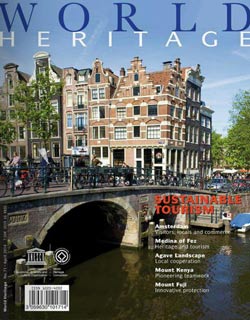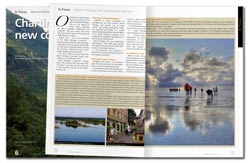Human evolution-related properties represent a process of evolutionaryaccretion that took place over a vastperiod of time, offering vital insight toscientific, cultural, ethological andhistorical dimensions of human development,and the earliest evidence ofhuman expressions and practices.
The World Heritage Thematic Programme ‘Human Evolution: Adaptations, Dispersals and Social Developments’ (HEADS) comes at a pertinent time in the history of the World Heritage Convention, when there is a call for a broader, more multidimensional concept of heritage. These challenges, which the World Heritage Committee has underlined in recent years, bring to the forefront the significant steps to be taken in the future evolution of the Convention. The HEADS Programme was launched in the context of the Global Strategy for a Representative, Balanced and Credible World Heritage List, initiated by the World Heritage Committee in 1994 to broaden the definition of World Heritage as well as the framework and implementation of the Convention.
As a global phenomenon, the related properties are not geographically exclusive. These vulnerable sites require an inclusive and comprehensive approach in terms of their study and conservation. The nature of the properties necessitates a strong cooperation between the fields of both science and culture to inform a deeper understanding of our cultural origins. This precious knowledge rests at the core of understanding human lineage and the origins of our cultural diversity, as well as its continuity today.
This publication offers an overview of the developments of the HEADS Programme since its inception in 2008, substantiated by scientific contributions from experts in the related fields of study: human evolution and sites related to early human origins, early archaeological sites and the beginning of cultural diversity, and rock art.
Table of Content s• Índice
In Memoriam of María Jesús San Segundo
En memoria de María Jesús San Segundo
Nuria Sanz
Foreword • Prólogo
Francesco Bandarin
Preface • Prefacio
Kishore Rao
Preface • Prefacio
Ángeles Albert de León
Introduction • Introducción
Nuria Sanz
World Heritage of Human Evolution and the commitment of International Cooperation
El Patrimonio Mundial de la evolucion humana y el compromiso de la cooperacion internacional
Chapter 1. Human Evolution: Adaptations, Dispersals and Social Developments (HEADS)
Processes and Outcomes
Chapter 2. Action Plan on HEADS
Chapter 3. Conclusions and Recommendations
Human Evolution and the World Heritage Convention
Burgos, Spain, 21 to 25 March 2009
Rock Art and the World Heritage Convention
uKhahlamba/Drakensberg Park, South Africa, 3 to 8 April 2009
Prehistoric Properties and the World Heritage Convention
Manama Bahrain, 10 to 14 May 2009
The Implementation of the Action Plan, Scientific Working Group
UNESCO Headquarters, Paris, 12 to 14 September 2009
Action Plan Scientific Working Group
UNESCO Headquarters, Paris, 17 to 18 May 2010
World Rock Art Archive Working Group
UNESCO Headquarters, Paris, 5 to 6 July 2010
World Rock Art Archive Working Group
Johannesburg, South Africa, 17 to 19 November 2010
African Human Origin Sites and the World Heritage Convention
Addis Ababa, Ethiopia, 8 to 11 February 2011
Preparation of the Management Plan for Tchitundo-Hulu Rock Art site
Virei, Angola, 14 to 23 March 2011
Chapter 4. HEADS Scientific Working Group
World Heritage and the evolution of modern human behaviour
Nicolas Conard
Rock art and hunter-gatherer communities in relation to World Heritage
Janette Deacon
Early origins of agriculture and World Heritage: the role of Asia
Ofer Bar-Yosef
Paleo-landscapes and vulnerability in the framework of the World Heritage Convention
Margherita Mussi
Attending lessons from human evolution-related sites in the context of World Heritage
Francois Sémah
Annexes
List of Participants
Meeting Agendas
- UNESCO Headquarters, Paris, France, November 2008
- Burgos, Spain, March 2009
- uKhahlamba/Drakensberg Park, South Africa, April 2009
- Manama, Bahrain, May 2009
- UNESCO Headquarters, Paris, September 2009
- UNESCO Headquarters, Paris, December 2009
- UNESCO Headquarters, Paris, May 2010
- UNESCO Headquarters, Paris, July 2010
- Johannesburg, South Africa, November 2010
- Addis Ababa, Ethiopia, February 2011
- Virei, Angola, March 2011








